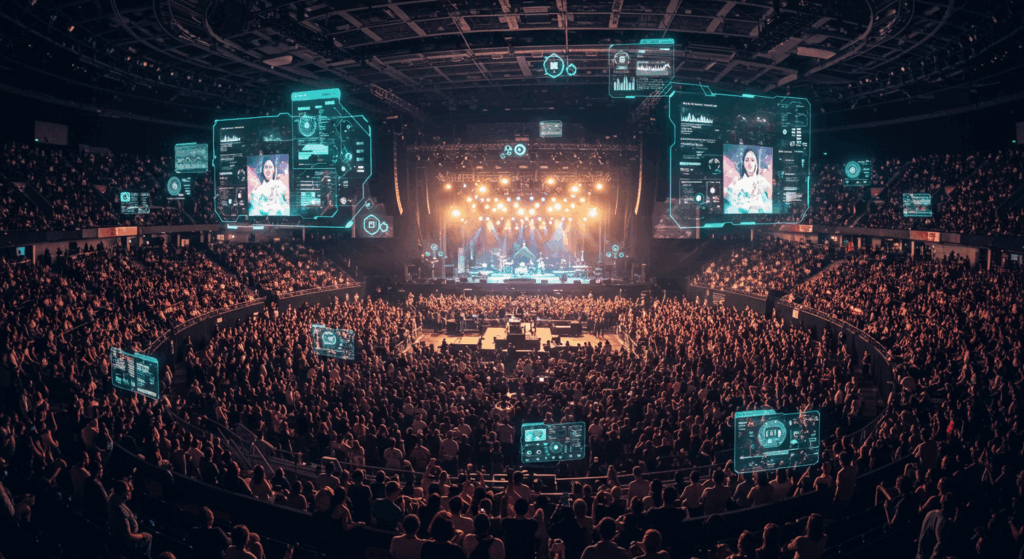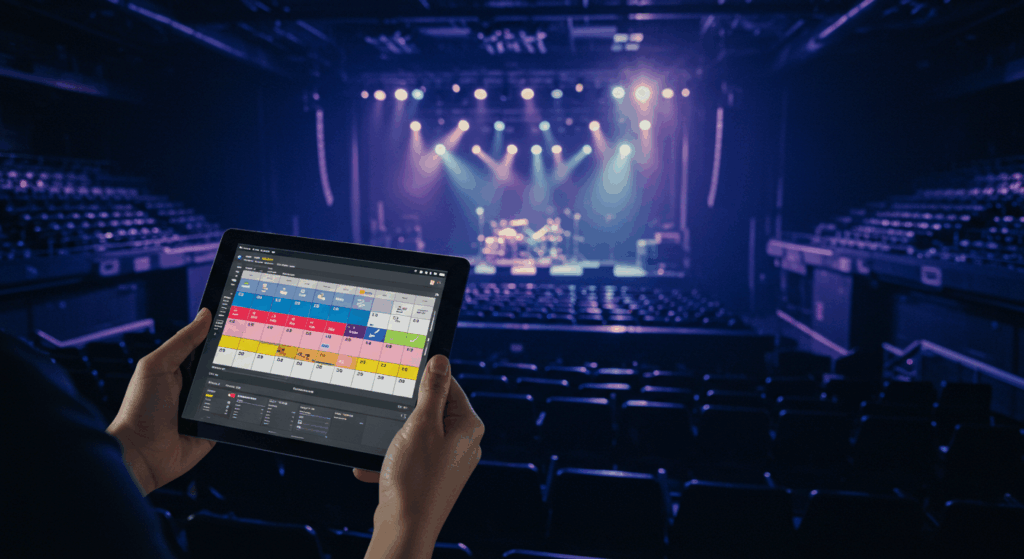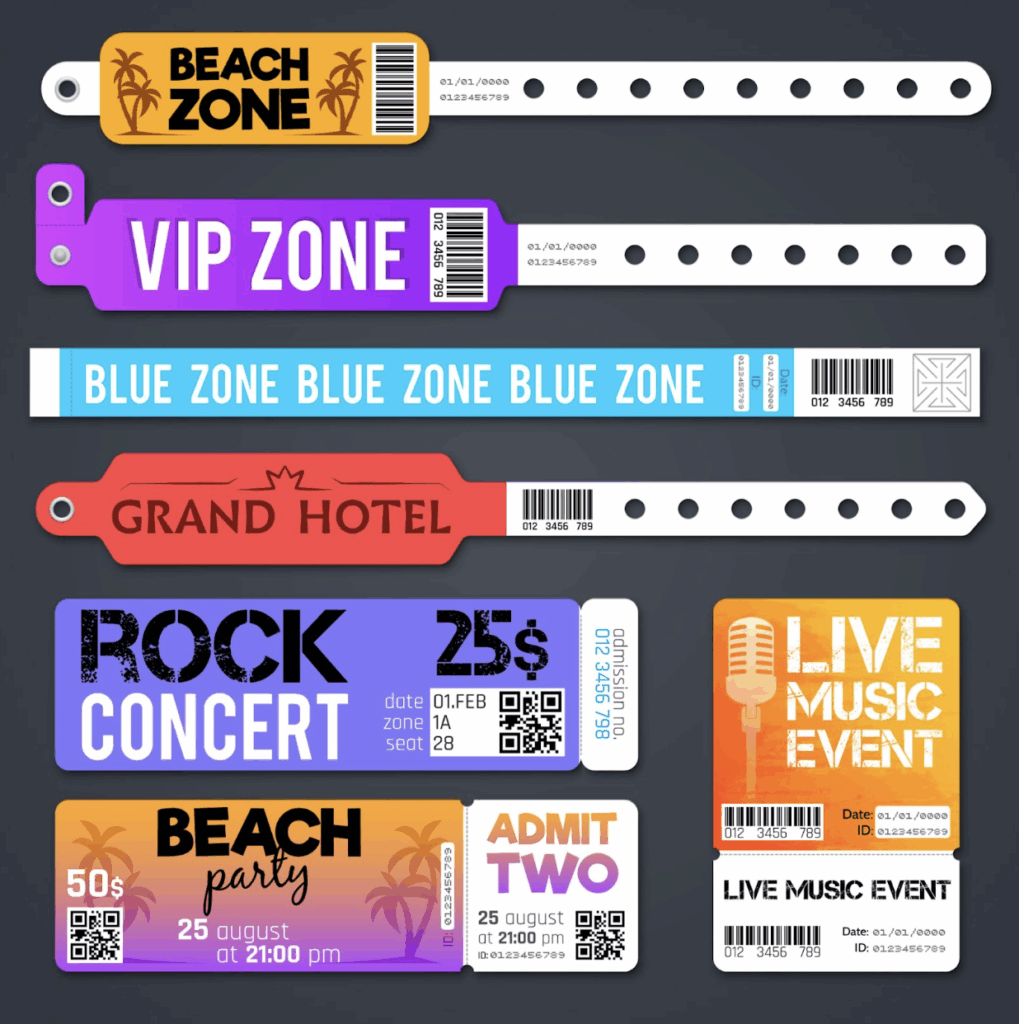
Concert Ticketing Software Revenue Guide 2025
SUMMARY: Music promoters are leveraging advanced concert ticketing software to maximize revenue through dynamic pricing strategies, mobile-first experiences, and integrated venue management systems. Key tactics include tiered pricing structures, real-time analytics, automated marketing, and seamless financial tracking that turns every ticket sale into actionable business intelligence.
The live music industry is experiencing unprecedented growth, with revenue jumping 25% in 2023 alone. But here’s the thing. While demand is skyrocketing, the promoters who are really crushing it aren’t just riding the wave. They’re using sophisticated concert ticketing software to transform how they price, sell, and track every aspect of their events.
Gone are the days when promoters could slap a flat price on tickets and hope for the best. Today’s most successful music promoters are treating their ticketing strategy like a high-stakes chess game, where every move is calculated, data-driven, and designed to squeeze maximum value from every seat in the house.
Why Is Concert Ticketing Software Make-or-Break for Modern Promoters?
The music promotion landscape has fundamentally shifted. What used to be a relationship-driven business built on handshake deals and spreadsheet tracking has evolved into a sophisticated operation where data reigns supreme and efficiency determines profitability.
Modern concert ticketing software isn’t just about processing transactions anymore. It’s become the central nervous system of successful promotion operations, connecting everything from initial marketing campaigns to final settlement reports.
The platforms that are winning in 2025 offer promoters real-time visibility into their business performance, automated workflows that eliminate manual grunt work, and integration capabilities that turn disparate tools into a unified command center.
The numbers don’t lie: according to industry research, promoters using integrated ticketing and management platforms report 15-20% higher revenues compared to those relying on standalone systems. The reason? They can react faster to market conditions, optimize pricing in real-time, and eliminate the revenue leaks that happen when systems don’t talk to each other.
Mobile optimization has become absolutely critical. With over 60% of ticket purchases now happening on mobile devices, promoters who haven’t optimized their ticketing experience for smartphones are leaving serious money on the table. The best concert ticketing software platforms ensure customers can complete purchases in three clicks or less, dramatically reducing cart abandonment rates.
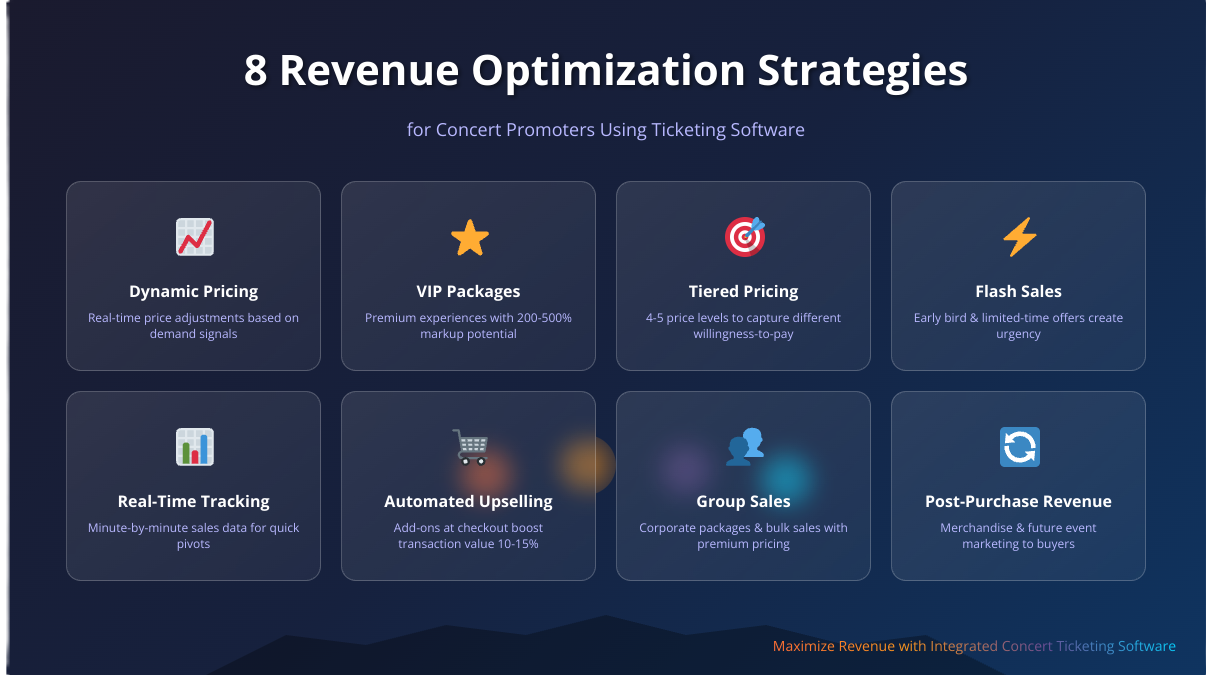
What Are the 8 Revenue Optimization Strategies Successful Promoters Use?
These aren’t theoretical marketing tactics or wishful thinking; they’re battle-tested strategies that top promoters are using right now to consistently outperform their competition. Each approach addresses a specific revenue opportunity that most promoters miss, and when combined, they create a systematic approach to maximizing every dollar from every event.
1. Dynamic Pricing That Actually Works
The dynamic pricing revolution has arrived in full force, but smart promoters are implementing it strategically rather than letting algorithms run wild. The key is transparency and gradual price adjustments rather than shocking fans with 300% increases mid-sale.
Successful promoters set initial prices conservatively, then use demand signals to adjust upward in smaller increments. This approach captures additional revenue from high-demand shows while maintaining fan loyalty. Some promoters are seeing 25-40% revenue increases on sold-out shows by implementing strategic dynamic pricing.
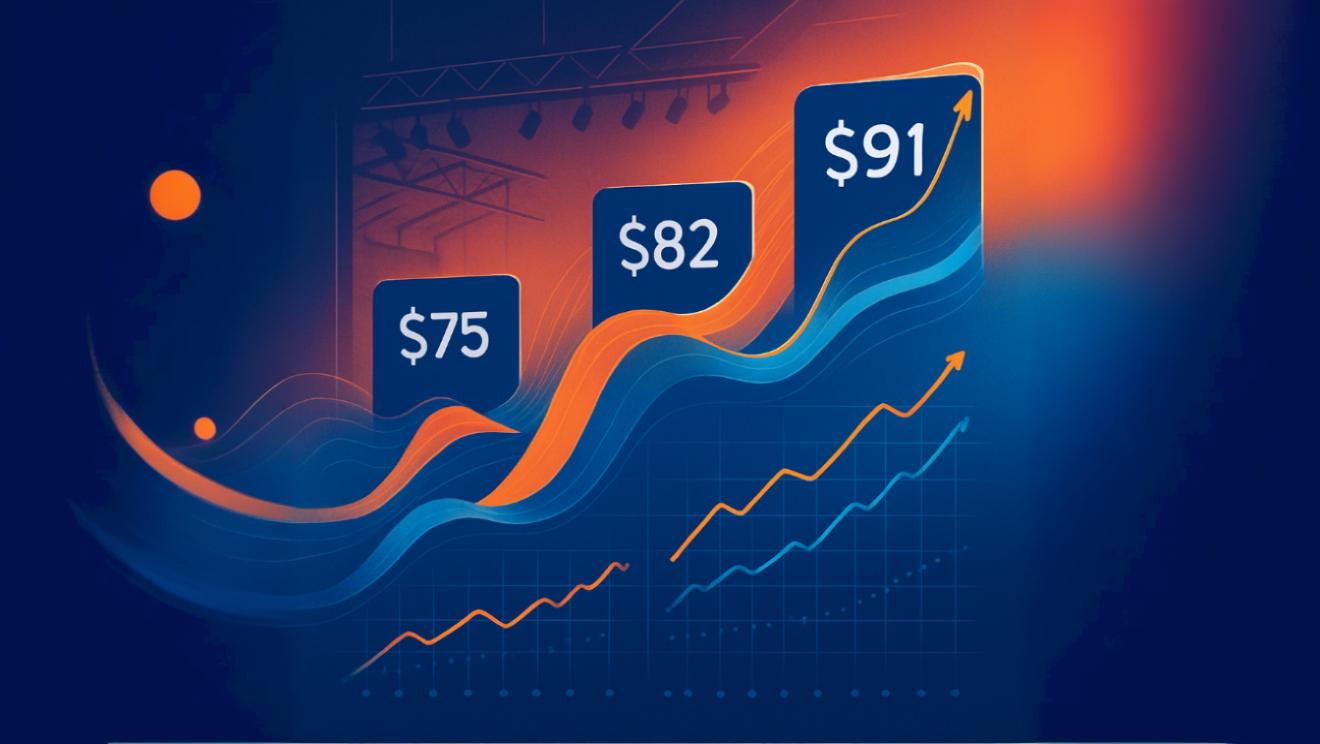
2. VIP Package Engineering
Modern fans aren’t just buying tickets. They’re buying experiences. Promoters are packaging premium experiences that include everything from meet-and-greets to exclusive merchandise, creating multiple revenue streams from a single event. These VIP packages often carry 200-500% markup over general admission pricing.
3. Tiered Pricing Psychology
Rather than offering just “general admission” and “VIP,” successful promoters are creating 4-5 distinct pricing tiers. This pricing ladder effect helps capture different willingness-to-pay segments while making mid-tier options appear more reasonable by comparison.
4. Early Bird and Flash Sale Campaigns
Strategic early bird pricing builds momentum while flash sales create urgency. The most effective promoters use their integrated marketing tools to coordinate these campaigns across email, social media, and partner channels simultaneously.
5. Real-Time Revenue Tracking and Pivoting
Advanced concert ticketing software provides minute-by-minute sales data, allowing promoters to adjust marketing spend, shift promotional tactics, or even upgrade to larger venues when demand exceeds expectations. This agility is crucial in today’s fast-moving market.
6. Automated Upselling at Checkout
Smart ticketing platforms present relevant upsells like parking passes, merchandise, and concessions credits, all at the optimal moment in the purchase flow. This can add 10-15% to average transaction values without feeling pushy to customers.
7. Group Sales and Corporate Packages
Promoters are systematically targeting group sales through automated corporate outreach and team-building package offerings. These bulk sales often command premium pricing while guaranteeing revenue weeks or months in advance.
8. Post-Purchase Revenue Streams
The relationship doesn’t end at ticket purchase. Top promoters use their ticketing platforms to continue marketing merchandise, future events, and premium experiences to customers who’ve already demonstrated buying intent.
How Does Integration Connect Your Ticketing to Your Business Operations?
Here’s where most promoters are missing the boat: they’re treating ticketing as an isolated function rather than as the central hub of their entire operation. The most successful promoters have realized that integrating ticketing with venue management software creates a multiplier effect that transforms their entire business.
When your ticketing platform seamlessly connects with your financial tracking, every ticket sale instantly updates your revenue projections, expense ratios, and profitability forecasts. This real-time visibility allows promoters to make informed decisions about marketing spend, venue size adjustments, and pricing strategies while there’s still time to impact the outcome.
Integration also eliminates the administrative nightmare that kills productivity. Instead of manually transferring sales data between systems, updating spreadsheets, and reconciling numbers across platforms, everything flows automatically. This gives promoters back hours of their day to focus on relationship building, creative planning, and business development.
The settlement process becomes dramatically smoother when ticketing data flows directly into financial management systems. Rather than spending days after each show reconciling numbers and calculating artist payments, automated settlement features can generate accurate reports within hours of an event’s conclusion.
Communication and team coordination improve exponentially when everyone works from the same data. Sales teams can see real-time ticket sales trends, marketing teams can track campaign performance against actual conversions, and operations teams can adjust staffing and logistics based on confirmed attendance numbers.
How Can Dynamic Pricing Maximize Revenue Without Alienating Fans?
Dynamic pricing remains one of the most controversial yet effective tools in modern concert promotion. The key is implementing it thoughtfully rather than aggressively. Research shows that fans accept dynamic pricing when it’s transparent, gradual, and feels fair.
The most successful approach involves setting clear price floors and ceilings upfront, then making modest adjustments based on genuine demand signals. Rather than shocking fans with dramatic price jumps, smart promoters implement gradual increases that reflect real market conditions.
Transparency is crucial. Leading promoters communicate their pricing strategy upfront, explaining that prices may adjust based on demand while ensuring fans understand they’re getting fair market value. This approach helps prevent the backlash that occurred during high-profile tours where fans felt blindsided by pricing changes.
The sweet spot appears to be dynamic adjustments in the 10-25% range rather than the dramatic increases that made headlines. This approach captures additional revenue from high-demand events while maintaining fan relationships and avoiding negative publicity.
Consider implementing dynamic pricing selectively—perhaps only for premium seating sections or VIP packages initially. This allows you to test the strategy’s effectiveness while preserving affordable options for price-sensitive fans.
What Should Your Complete Promoter Tech Stack Include?
Building an effective concert promotion operation requires more than just ticketing software. The most successful promoters have assembled integrated tech stacks that handle every aspect of their business from initial planning through final settlement.
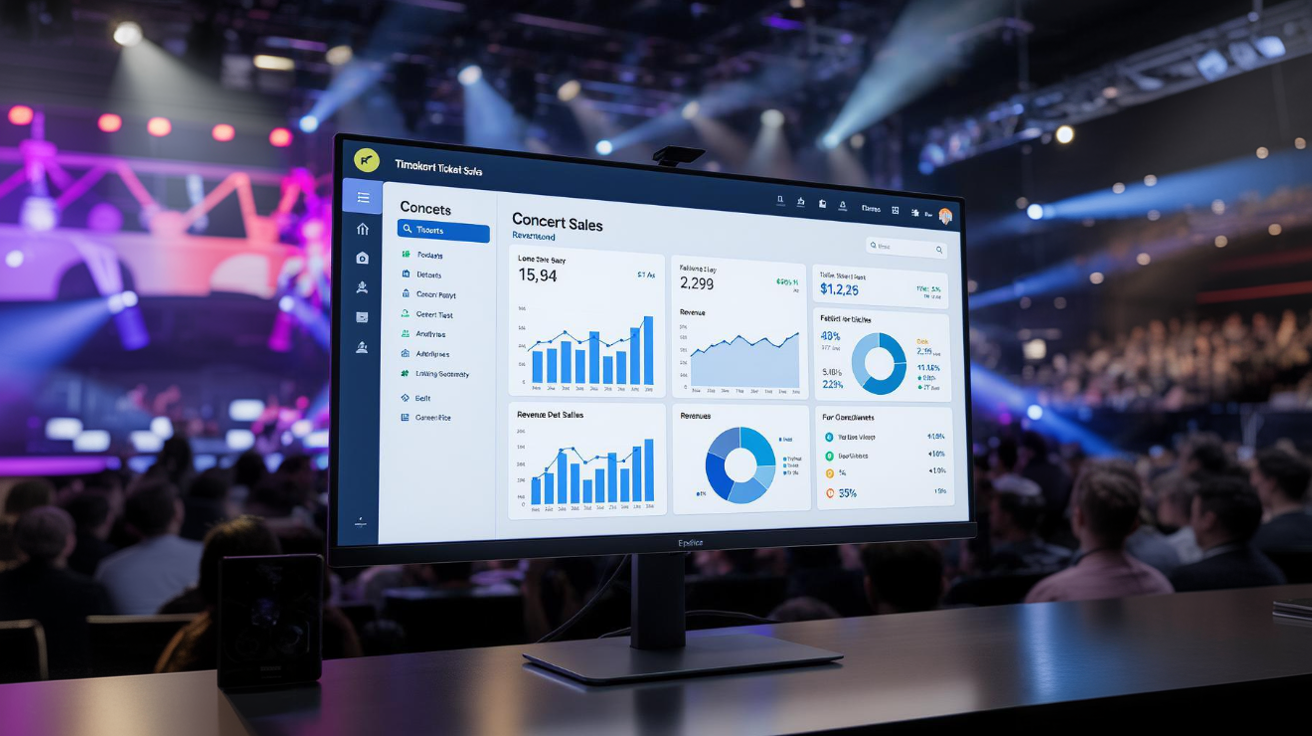
Your core platform should combine concert ticketing software with financial management, calendar coordination, and communication tools. This integration eliminates the need to jump between multiple platforms while ensuring data consistency across your entire operation.
Marketing automation capabilities are essential. Your platform should connect with email marketing systems, social media management tools, and advertising platforms to create coordinated campaigns that drive ticket sales efficiently. The ability to track marketing spend against actual revenue in real-time helps optimize campaign performance.
Financial tracking and reporting features need to go beyond basic accounting. Look for platforms that provide profit and loss modeling, expense categorization, real-time budget tracking, and automated settlement calculations. These capabilities transform financial management from a post-event headache into a real-time strategic advantage.
Mobile accessibility isn’t optional. Your entire team needs to access critical information and make decisions from anywhere. Whether they’re at the venue, meeting with artists, or traveling between locations, mobile-first platforms keep operations running smoothly.
Analytics and reporting capabilities should provide actionable insights rather than just raw data. The best platforms help you understand customer behavior patterns, identify your most profitable events, and spot trends that inform future booking decisions.
Customer relationship management features help maintain connections with fans, artists, venues, and partners. Integrated CRM capabilities ensure no opportunities fall through the cracks while building stronger relationships across your network.
The goal is creating a unified ecosystem where every component works together seamlessly. When your ticketing, marketing, finance, and operations tools share data and workflows, you eliminate inefficiencies while gaining strategic advantages that separate top promoters from the competition.
Turn Your Ticketing Strategy Into Your Competitive Advantage
Concert promotion in 2025 demands more than just booking great acts and hoping for sell-outs. The promoters who are building sustainable, profitable businesses understand that their ticketing strategy is actually their business strategy. They’re using sophisticated concert ticketing software not just to process transactions, but to create competitive advantages that compound over time.
The revenue optimization tactics we’ve covered, from strategic dynamic pricing to seamless integration workflows, aren’t just theoretical concepts. They’re proven strategies that successful promoters are using right now to build more profitable, efficient operations while delivering better experiences for fans and artists alike.
Ready to transform your promotion operation with integrated concert ticketing software that drives real results? Get started with Prism and discover how the right platform can help you maximize revenue, streamline operations, and focus on what you love most about live music.
Frequently Asked Questions
What’s the difference between basic ticketing platforms and concert ticketing software designed for promoters?
Concert ticketing software designed for promoters integrates ticketing with business management functions like financial tracking, marketing automation, and settlement processing. Basic platforms only handle transactions, while promoter-focused solutions provide real-time business intelligence and workflow automation that directly impacts profitability.
How much revenue increase can promoters expect from implementing dynamic pricing?
Industry data suggests promoters implementing strategic dynamic pricing see 15-40% revenue increases on high-demand shows. However, success depends on the implementation approach. Gradual, transparent adjustments perform better than aggressive pricing swings that can damage fan relationships.
Is it worth switching from our current ticketing platform to an integrated solution?
If you’re currently using separate systems for ticketing, finances, and operations, switching to an integrated platform typically pays for itself within 2-3 events through time savings and improved revenue optimization. The key is evaluating total cost of ownership rather than just platform fees.
How can smaller promoters compete with major companies using expensive ticketing technology?
Modern concert ticketing software has become much more accessible, with comprehensive platforms now available at price points that work for independent promoters. The key is focusing on integration and automation rather than trying to match the scale of major companies.

Matt Ford is the founder and CEO of Prism.fm, an Austin-based software company revolutionizing live music event management. With a background in entrepreneurship and a degree from the University of Wisconsin-Madison School of Business, Ford combined his self-taught coding skills with firsthand experience as a concert promoter to address the inefficiencies he observed in the industry. In 2018, he launched Prism.fm, an all-in-one platform designed to streamline operations for venues, promoters, and agencies by replacing cumbersome spreadsheets with integrated tools for booking, financial tracking, and contract management. Under his leadership, Prism.fm has grown significantly, achieving $3 million in annual recurring revenue post-COVID and securing over $15 million in funding . Ford’s commitment to building user-centric solutions has positioned Prism.fm as a trusted partner for over 1,500 venues and promoters worldwide.

